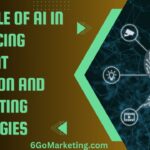Artificial intelligence (AI) is rapidly transforming various industries, and Customer Relationship Management (CRM) systems are no exception. AI’s integration into CRM systems is revolutionizing the way businesses manage customer interactions, analyze data, and automate processes. As companies strive to offer personalized experiences and build stronger customer relationships, AI-powered CRM systems are becoming indispensable tools for achieving these goals.
This comprehensive blog post explores the impact of AI on CRM systems, delving into how AI is enhancing CRM functionalities, the benefits it offers, the challenges it presents, and the future of AI-driven CRM. Whether you’re a business leader, marketer, or CRM user, understanding the role of AI in CRM systems is crucial for staying competitive in today’s fast-paced business environment.
Understanding AI in CRM Systems
Before diving into the impact of AI on CRM systems, it’s important to understand what AI is and how it functions within the context of CRM.
What is AI?
Artificial intelligence (AI) refers to the simulation of human intelligence in machines that are designed to perform tasks that typically require human intelligence. These tasks include problem-solving, decision-making, language understanding, and pattern recognition. In CRM systems, AI is used to analyze customer data, predict customer behavior, and automate routine tasks, among other functions.
How AI is Integrated into CRM Systems
AI is integrated into CRM systems through various technologies, including machine learning, natural language processing (NLP), and predictive analytics. These technologies enable CRM systems to process large volumes of data, identify patterns, and provide insights that help businesses make data-driven decisions.
Key AI Technologies in CRM:
- Machine Learning (ML): Machine learning algorithms analyze customer data to identify trends, predict future behavior, and automate tasks. ML models improve over time as they process more data, making predictions more accurate.
- Natural Language Processing (NLP): NLP enables CRM systems to understand and interpret human language, allowing for more effective communication with customers through chatbots, email automation, and sentiment analysis.
- Predictive Analytics: Predictive analytics uses historical data to forecast future customer behavior, such as predicting which customers are most likely to churn or which leads are most likely to convert.
Example Table: AI Technologies Used in CRM Systems
| AI Technology | Description | Application in CRM |
|---|---|---|
| Machine Learning (ML) | Algorithms that learn from data to improve over time | Predictive lead scoring, customer segmentation |
| Natural Language Processing (NLP) | Understanding and interpreting human language | Chatbots, sentiment analysis, automated responses |
| Predictive Analytics | Analyzing historical data to predict future outcomes | Churn prediction, sales forecasting |
The Benefits of AI-Powered CRM Systems
AI-powered CRM systems offer a wide range of benefits that enhance the efficiency, accuracy, and effectiveness of customer relationship management. These benefits are transforming how businesses interact with customers, manage data, and drive growth.
Enhanced Customer Experience
One of the most significant benefits of AI in CRM systems is the ability to deliver a more personalized and seamless customer experience. By analyzing customer data and behavior, AI-powered CRM systems can tailor interactions to meet individual customer needs.
This is especially valuable for businesses looking to improve customer satisfaction and loyalty. Unlike traditional customer satisfaction surveys, AI-powered solutions like AskNicely alternatives can provide real-time insights and enable more proactive customer support.
Ways AI Enhances Customer Experience:
- Personalized Recommendations: AI analyzes customer purchase history and preferences to recommend products and services that are most relevant to each individual. This personalization leads to higher customer satisfaction and increased sales.
- 24/7 Customer Support: AI-powered chatbots and virtual assistants provide instant, round-the-clock support, answering customer queries and resolving issues without human intervention. This improves response times and ensures customers receive assistance when they need it.
- Proactive Engagement: AI can predict when a customer might need assistance or be ready for a new purchase, allowing businesses to engage with customers proactively. For example, AI can send reminders for subscription renewals or offer discounts to customers showing signs of churn.
Quote: “AI-powered CRM systems are revolutionizing customer experience by providing personalized, timely, and relevant interactions. Businesses that leverage AI to enhance customer engagement will gain a competitive edge.” — John Smith, CRM Specialist
Improved Sales and Marketing Efficiency
AI-driven CRM systems streamline sales and marketing processes by automating tasks, optimizing lead management, and providing data-driven insights. This results in more efficient and effective sales and marketing efforts.
Key Areas Where AI Improves Efficiency:
- Lead Scoring: AI-powered lead scoring models analyze customer data to identify the leads most likely to convert. This allows sales teams to prioritize high-potential leads and focus their efforts on the most promising opportunities.
- Sales Forecasting: AI can predict future sales trends based on historical data, helping businesses set realistic sales targets and allocate resources more effectively.
- Marketing Automation: AI automates repetitive marketing tasks, such as email campaigns, social media posting, and ad targeting. This not only saves time but also ensures that marketing efforts are more personalized and relevant to the target audience.
Example Table: AI Applications in Sales and Marketing
| Application | Description | Benefits |
|---|---|---|
| Lead Scoring | Analyzing customer data to prioritize leads | Focuses sales efforts on high-potential leads |
| Sales Forecasting | Predicting future sales trends | Helps set realistic targets, improves resource allocation |
| Marketing Automation | Automating repetitive marketing tasks | Increases efficiency, enhances personalization |
Data-Driven Decision Making
AI-powered CRM systems provide businesses with valuable insights derived from customer data. These insights enable data-driven decision-making, leading to more effective strategies and better business outcomes.
How AI Supports Data-Driven Decision Making:
- Customer Segmentation: AI can analyze customer data to create detailed segments based on demographics, behavior, and preferences. This allows businesses to tailor their marketing and sales strategies to specific customer groups.
- Predictive Analytics: AI-driven predictive analytics helps businesses forecast customer behavior, such as predicting which customers are most likely to churn or which products are likely to sell well. These predictions inform strategic decisions and help businesses stay ahead of market trends.
- Performance Monitoring: AI tools can monitor the performance of sales and marketing campaigns in real-time, providing actionable insights that allow businesses to adjust their strategies on the fly.
Quote: “In today’s data-driven world, AI-powered CRM systems are essential for making informed decisions. By turning raw data into actionable insights, AI helps businesses optimize their strategies and achieve better results.” — Jane Doe, Data Analyst
Increased Productivity and Automation
AI significantly increases productivity by automating routine tasks, freeing up employees to focus on higher-value activities. Using some of the best ChatGPT apps makes this even easier, seamlessly integrating AI into everyday tasks. This automation also reduces the likelihood of human error, ensuring more accurate and consistent results.
Examples of AI-Driven Automation in CRM:
- Task Automation: AI can automate repetitive tasks, such as data entry, scheduling, and follow-up emails. This reduces the administrative burden on employees and allows them to focus on more strategic activities.
- Process Optimization: AI can analyze business processes and identify inefficiencies, recommending improvements that streamline workflows and enhance productivity.
- Document Automation: AI tools can automatically generate and manage documents, such as contracts, proposals, and reports, ensuring consistency and accuracy across the organization. An example of such a tool is ChatPDF, which can instantly rewrite, summarize, explain, or translate files to streamline your workflow.
Example Table: AI-Driven Automation in CRM Systems
| Automation Type | Description | Impact on Productivity |
|---|---|---|
| Task Automation | Automating routine tasks such as data entry | Reduces administrative burden, saves time |
| Process Optimization | Analyzing workflows to identify inefficiencies | Streamlines operations, improves efficiency |
| Document Automation | Automatically generating and managing documents | Ensures consistency, reduces errors |
Challenges of Implementing AI in CRM Systems
While the benefits of AI-powered CRM systems are significant, implementing AI in CRM also presents several challenges. Businesses must be aware of these challenges and take steps to address them to fully leverage the potential of AI in CRM.
Data Quality and Integration
AI’s effectiveness in CRM systems depends heavily on the quality and integration of data. Poor data quality or fragmented data can lead to inaccurate predictions and ineffective AI-driven strategies.
Challenges with Data Quality and Integration:
- Incomplete or Inaccurate Data: AI models require high-quality data to make accurate predictions. Incomplete, outdated, or inaccurate data can result in flawed insights and poor decision-making.
- Data Silos: Many organizations struggle with data silos, where customer data is stored in separate systems that don’t communicate with each other. This fragmentation makes it difficult to get a holistic view of the customer and undermines the effectiveness of AI.
- Data Integration: Integrating data from multiple sources into a single CRM system can be complex and time-consuming. Ensuring that data is harmonized and consistently formatted is crucial for effective AI implementation.
Strategies to Address Data Challenges:
- Data Cleaning: Regularly clean and update your data to ensure its accuracy and completeness. This may involve removing duplicates, correcting errors, and filling in missing information.
- Unified Data Platforms: Implement a unified data platform that consolidates data from various sources into a single system, providing a comprehensive view of the customer.
- Data Governance: Establish data governance policies that ensure data quality and consistency across the organization.
Cost and Resource Requirements
Implementing AI in CRM systems can be costly and resource-intensive. Businesses need to consider the financial investment and the need for specialized skills and expertise.
Challenges with Cost and Resources:
- Skill Gaps: Implementing and managing AI in CRM systems requires specialized skills in data science, machine learning, and AI technologies. Many organizations may face challenges in finding and retaining talent with the necessary expertise to handle these complex systems.
- Time Investment: Integrating AI into existing CRM systems and processes is not a quick endeavor. It often involves a significant time investment for setup, training, and fine-tuning the AI models to align with the company’s specific needs.
- Ongoing Maintenance: AI-powered CRM systems require regular updates, continuous monitoring, and maintenance to ensure they function optimally. This ongoing requirement can strain resources, especially for smaller businesses with limited IT support.
Strategies to Mitigate Cost and Resource Challenges:
- Start Small: Begin by implementing AI in specific areas of your CRM system where it can have the most immediate impact, such as lead scoring or customer segmentation. Gradually expand AI capabilities as you see results and gain more expertise.
- Leverage AI as a Service: Consider using AI-powered CRM solutions offered as a service by third-party providers. These solutions often come with built-in AI capabilities, reducing the need for extensive in-house development and maintenance.
- Invest in Training: Upskill your existing workforce by providing training in AI and data science. This approach not only addresses the skill gap but also ensures that your team is equipped to manage and optimize AI-driven CRM systems. This approach not only addresses the skill gap but also ensures that your team is equipped to manage and optimize AI-driven CRM systems. Building these skills is key to achieving AI readiness for your business.
Example Table: Cost and Resource Considerations for AI Implementation in CRM
| Consideration | Description | Mitigation Strategy |
|---|---|---|
| High Implementation Costs | Significant upfront investment in AI technology | Start small, leverage AI as a service |
| Skill Gaps | Lack of expertise in AI and data science | Invest in training, partner with AI vendors |
| Ongoing Maintenance | Continuous updates and monitoring required | Use managed AI services, allocate dedicated resources |
Ethical and Privacy Concerns
AI in CRM systems also raises ethical and privacy concerns, particularly regarding the handling of customer data. As businesses increasingly rely on AI to analyze and leverage customer information, they must ensure that they are using this data responsibly and in compliance with regulations.
Challenges with Ethics and Privacy:
- Data Privacy: AI-powered CRM systems often require access to large amounts of customer data to function effectively. This raises concerns about how data is collected, stored, and used, particularly in light of regulations like GDPR (General Data Protection Regulation) and CCPA (California Consumer Privacy Act).
- Bias in AI Models: AI models can inadvertently introduce or perpetuate biases present in the data they are trained on. This can lead to biased decision-making in areas such as lead scoring or customer segmentation, potentially resulting in unfair treatment of certain customer groups.
- Transparency and Accountability: As AI systems make more decisions autonomously, there is a need for greater transparency in how these decisions are made. Businesses must ensure that they can explain and justify AI-driven decisions to customers and regulators.
Strategies to Address Ethical and Privacy Challenges:
- Adopt Privacy by Design: Implement privacy by design principles, which involve integrating privacy considerations into the development and deployment of AI systems from the outset. This includes minimizing data collection, using data anonymization techniques, and ensuring compliance with relevant regulations.
- Bias Mitigation: Regularly audit AI models to identify and mitigate potential biases. This may involve using diverse and representative training datasets, as well as incorporating fairness checks into the AI development process.
- Transparency Practices: Ensure that AI-driven decisions are transparent and explainable. Provide customers with clear information about how their data is used and the factors that influence AI-driven outcomes. Establish accountability mechanisms to address any issues that arise from AI use.
Quote: “As AI becomes more integrated into CRM systems, businesses must navigate the complex ethical and privacy landscape. Ensuring transparency, fairness, and compliance will be key to building trust with customers and regulators.” — Sarah Johnson, Data Privacy Expert
The Future of AI in CRM Systems
The future of AI in CRM systems looks promising, with continued advancements in AI technologies poised to further enhance CRM capabilities. As AI becomes more sophisticated, CRM systems will evolve to offer even more powerful tools for managing customer relationships, driving sales, and optimizing marketing strategies.
AI-Driven Predictive Analytics
In the future, AI-driven predictive analytics will play an even more central role in CRM systems. These advanced analytics tools will provide businesses with deeper insights into customer behavior, enabling them to anticipate customer needs, predict trends, and make more informed decisions.
Future Applications of Predictive Analytics:
- Customer Lifetime Value Prediction: AI will be able to predict the lifetime value of individual customers with greater accuracy, allowing businesses to focus their efforts on retaining high-value customers.
- Sales Pipeline Optimization: Predictive analytics will help sales teams identify bottlenecks in the sales pipeline and optimize the sales process to close deals more efficiently.
- Customer Journey Mapping: AI will provide a more detailed understanding of the customer journey, helping businesses tailor their interactions at each stage to maximize engagement and conversion rates.
Enhanced Personalization and Hyper-Personalization
AI will continue to drive advancements in personalization, moving towards hyper-personalization, where content, offers, and interactions are tailored to individual customers in real-time. This level of personalization will be possible thanks to AI’s ability to process vast amounts of data quickly and deliver insights at scale.
Future of Personalization in CRM:
- Real-Time Personalization: AI will enable real-time personalization, where customer interactions are customized on the fly based on the most current data, such as browsing behavior, purchase history, and social media activity.
- Contextual Engagement: AI-powered CRM systems will take into account the context in which customers interact with a brand—such as location, time of day, and device used—to deliver more relevant and timely messages.
- Omnichannel Integration: AI will facilitate seamless integration across multiple channels, ensuring that personalization is consistent and cohesive across email, social media, mobile apps, and in-store experiences.
Example Table: The Future of Personalization in CRM
| Personalization Level | Description | AI Capabilities Required |
|---|---|---|
| Real-Time Personalization | Customizing interactions based on live data | Advanced data processing, real-time analytics |
| Contextual Engagement | Tailoring messages based on contextual factors | Context-aware AI, behavioral analysis |
| Omnichannel Integration | Ensuring consistency across all channels | Cross-channel data integration, AI-driven coordination |
AI-Powered Virtual Assistants and Chatbots
AI-powered virtual assistants and chatbots will become even more sophisticated, offering human-like interactions and providing more complex support. These tools will handle a broader range of tasks, from answering customer inquiries to completing transactions and even offering personalized product recommendations.
Future Capabilities of AI-Powered Assistants:
- Natural Language Understanding: Virtual assistants will be able to understand and respond to customer inquiries with greater accuracy, using advanced natural language processing (NLP) to interpret nuanced questions and provide relevant answers.
- Multi-Turn Conversations: AI chatbots will be capable of handling multi-turn conversations, where they can engage in back-and-forth dialogue with customers, offering a more natural and interactive experience.
- Transactional Capabilities: AI assistants will be able to handle transactions, such as processing payments, managing bookings, and making product recommendations, all within a single conversation.
AI Ethics and Regulation
As AI becomes more integral to CRM systems, there will be increased focus on developing ethical guidelines and regulatory frameworks to govern its use. Businesses will need to stay informed about these developments and ensure that their AI-driven CRM strategies comply with evolving standards.
Future Ethical and Regulatory Considerations:
- AI Transparency and Explainability: Regulations may require businesses to provide more transparency and explainability in AI-driven decisions, ensuring that customers understand how their data is used and how decisions are made.
- Bias and Fairness Standards: New standards may emerge to address bias in AI, requiring businesses to regularly audit their AI models for fairness and take corrective actions as needed.
- Data Privacy Regulations: As data privacy concerns grow, regulations may become stricter, requiring businesses to adopt more robust data protection measures and obtain explicit consent for AI-driven data processing.
Quote: “The future of AI in CRM will be defined by a balance between innovation and responsibility. As businesses harness the power of AI to enhance customer relationships, they must also ensure that ethical considerations and regulatory compliance are at the forefront of their strategies.” — Mark Thompson, AI Ethics Advocate
Conclusion
The integration of artificial intelligence into CRM systems is transforming the way businesses manage customer relationships, optimize sales and marketing efforts, and make data-driven decisions. AI-powered CRM systems offer numerous benefits, including enhanced customer experience, improved efficiency, and increased productivity, making them essential tools for modern businesses.
However, the successful implementation of AI in CRM systems also comes with challenges, such as data quality issues, cost considerations, and ethical concerns. Businesses must address these challenges to fully realize the potential of AI-driven CRM and build trust with their customers.
As AI technology continues to evolve, the future of CRM systems will be characterized by even more advanced capabilities, including predictive analytics, hyper-personalization, and sophisticated virtual assistants. By staying informed and adopting best practices, businesses can leverage AI to create more meaningful and effective customer relationships, driving growth and success in an increasingly competitive marketplace.









